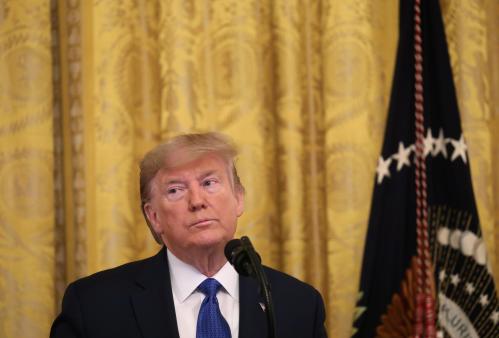The United States sends mixed messages on African engagement
Last Friday, the Trump administration expanded its travel ban on Muslim-majority countries. The new policy affects four African countries—Nigeria, Eritrea, Tanzania, and Sudan—in addition to Kyrgyzstan and Myanmar. For those from Nigeria and Eritrea, the move severely restricts access to visas that could end with permanent residency in the United States. For those from Tanzania and Sudan, the move ends “diversity” migration visas. Acting Homeland Security Secretary Chad Wolf defended the decision, saying that those countries failed to meet U.S. security and information-sharing standards. The move is an extension of the highly controversial 2017 travel ban that barred nearly all immigrants from Chad, Libya, and Somalia, in addition to five non-African countries.
On Thursday, though, U.S. Secretary of Defense Mark Esper announced that the United States would not be withdrawing all its forces from Africa. Around 6,000 U.S. military personnel are currently stationed on the continent. The announcement came amidst a global troop review looking to free up resources to counter China’s growing military influence, according to The New York Times. Last week, not long after the U.S. announced the review, French Defense Minister Florence Parly visited the Pentagon to push for a continuation of U.S. counterterrorism efforts in West Africa, given France’s presence in the region. Both Democrats and Republicans have warned that a mass withdrawal from Africa would hurt U.S. national security and cede influence to China and Russia, a point confirmed by General Stephen Townsend, head of U.S. Africa Command, in his testimony to the Senate Armed Services Committee at the end of January.
In other U.S.-Africa news, on Tuesday, the U.S. announced $40 million in aid to Nigeria to address the humanitarian crisis created and fueled by the conflict with Boko Haram. Then, on Wednesday, the U.S. Department of State announced that Secretary of State Mike Pompeo will be visiting Africa later this month, with stops in Senegal, Angola, and Ethiopia between February 15 and 19.
For more on recent U.S.-Africa relations, see AGI Nonresident Fellow Witney Schneidman’s recent blog, Can an investment summit save Trump’s Africa policy?
Election updates: Malawi and Guinea-Bissau
On Monday, the Constitutional Court of Malawi annulled the recent reelection of President Peter Mutharika, citing “widespread, systematic and grave” irregularities. According to official third-party reports, the election was not run on a level playing field; reported problems with the 2019 election ranged from concerns over media fairness, ballot secrecy, fear of political intimidation or violence, and even use of correction fluid. Indeed, according to Afrobarometer, a majority of Malawians say that the election was not free and fair. Following months of protests in capital city Lilongwe, High Court judges—all five of whom openly spoke about bribery attempts received prior to the announcement—declared a repeat election to take place within 150 days of the original annulment. Mutharika is appealing the ruling to the country’s Supreme Court.
Also this week, Guinea-Bissau’s National Electoral Commission declared that Umaro Sissoco Embalo defeated opposition candidate Domingos Simoes Pereia on Wednesday in the second round of the nation’s recent presidential election. Embalo carried 54 percent of the vote in the December runoff election after coming in second during November’s initial round to Pereia. Both men once served as prime ministers under former president Jose Mario Vaz. Many citizens express hope that the Wednesday results can serve as a solution to several years of political instability. Pereira has since stated he intends to contest the runoff results, though the African Union declared that the election was “conducted in peace and security necessary for the free expression of suffrage.”
Nigeria to receive $300 million in repatriated funds from Jersey
This week, Nigeria, the United States, and the British dependency of Jersey jointly announced that more than $300 million in stolen funds would be returned to Nigeria. This money is part of an estimated $5 billion illegally taken by former military leader General Sani Abacha, who ruled the country between 1993 and 1998. According to the BBC, the funds were transferred to Jersey through the U.S. banking system in the 1990s. The Royal Court in Jersey froze the account in 2014 after U.S. courts ruled that Abacha had stolen the money from Nigeria during his presidency. According to Nigeria’s attorney general, the funds will be managed through the country’s sovereign wealth fund and be used to build road infrastructure.
In recent years, Nigeria has worked closely with foreign governments to repatriate stolen funds. For example, before this week’s announcement, Nigeria had already recovered more than $1.6 billion in funds stolen by Abacha including $321 million from Switzerland in 2017. Additionally, the U.S. Department of Justice is also in the process of enforcing two forfeiture agreements with Britain and France for $30 million and $144 million, respectively.






Commentary
Africa in the news: Updates on US-Africa relations, elections in Malawi and Guinea-Bissau, and return of stolen funds to Nigeria
February 8, 2020